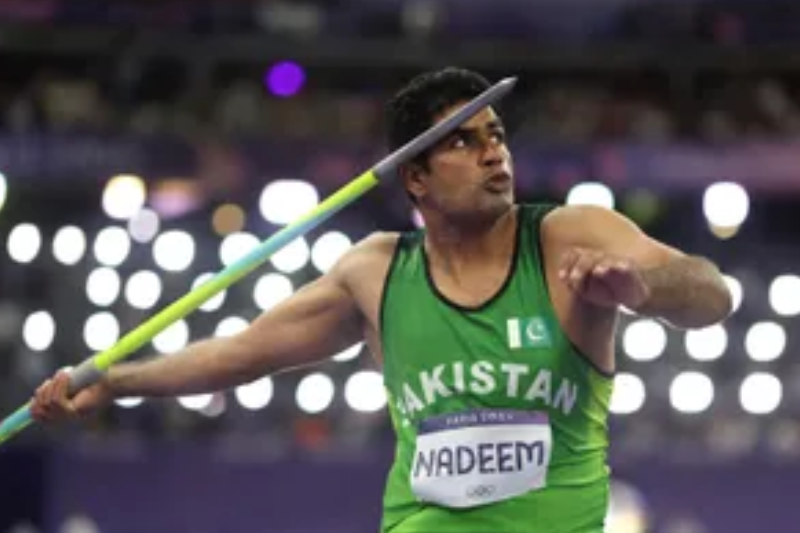The controversy surrounding the Athletics Federation of Pakistan’s lifetime ban on Olympic champion Arshad Nadeem’s coach Salman Butt has escalated to the highest levels of government, with federal authorities ordering a comprehensive investigation into the controversial decision. This intervention signals serious concerns about governance, transparency, and the treatment of individuals instrumental to Pakistan’s historic athletic achievements.
According to reports in local media, the federal government has taken notice of the lifetime ban imposed on Salman Butt and has directed an in-depth inquiry into the controversial decision made by the Athletics Federation of Pakistan (AFP). The government’s decision to intervene underscores the seriousness of the situation, given the coach’s pivotal role in Pakistan’s athletics revival.
The Pakistan Sports Board (PSB) has been instructed to submit a comprehensive report to the Ministry of Inter-Provincial Coordination (IPC) after completing its investigation. The inquiry will examine the reasons, motives, and transparency behind the federation’s decision to ban the renowned coach who guided Arshad Nadeem to Pakistan’s first-ever Olympic gold medal in athletics.
The Athletics Federation of Pakistan on October 13 announced a lifetime ban on Salman Butt, citing alleged violations related to his election as President of the Punjab Athletics Association. After careful review and deliberation, the Executive Committee imposed a lifetime ban on Salman Butt for gross violations of the AFP Constitution, on which he himself is a signatory.
The ban prevents Butt from participating in any athletics activity—whether as an athlete, coach, official, or office bearer—at both national and international levels, inside or outside Pakistan. This sweeping prohibition effectively ends his coaching career with Pakistan’s athletics program despite his central role in the country’s greatest athletic achievement.
The AFP declared the Punjab Athletics Association elections held on August 31, 2025, illegal and unconstitutional, noting that the polls were announced just two days in advance, violating the mandatory 21-day notice period required under the AFP constitution. These elections were announced at midnight on August 29, 2025, merely two days before being held.
According to AFP statements, even the Senior Vice President of the Punjab Athletics Association was unaware of the election schedule until August 30, 2025, just one day before the elections. This lack of notice period and transparency formed the basis for declaring the elections null and void.
Responding to the ban, Salman Butt strongly rejected the allegations, calling them baseless and retaliatory, stemming from his recent criticisms of the AFP. The coach maintains that the ban represents retaliation for his outspoken criticism of federation management rather than legitimate constitutional concerns.
Butt previously criticized the AFP for inadequate support following Arshad Nadeem’s 10th-place finish at the World Athletics Championships in Tokyo. In his response letter to the AFP’s performance inquiry, Butt revealed that much of Nadeem’s overseas training was privately funded rather than supported by the federation, highlighting systemic issues within Pakistan athletics.
The decision against Butt comes against the backdrop of AFP seeking reasons behind a sharp decline in Arshad’s performance where he finished 10th in the men’s javelin final at the World Athletics Championship held in Tokyo last month. In his reply to AFP, Butt explained that heat, humidity, and calf pain prevented Arshad from performing to his usual standards.
Butt detailed how Arshad’s preparation was disrupted by a leg injury requiring surgery in England, followed by three-week rehabilitation before traveling to Tokyo. This medical context provided reasonable explanation for performance decline, yet tensions between Butt and AFP administration continued escalating.
The decision sparked widespread debate within Pakistan’s sports community, as Butt has been a key figure in the training and success of Arshad Nadeem, who made history by winning the country’s first-ever Olympic gold medal in athletics at Paris 2024. Their partnership transformed Arshad’s international trajectory, producing:
- Olympic gold medal at Paris 2024 with record 92.97m throw
- Commonwealth Games gold in 2022
- World Championships silver in 2023
- Multiple international medals between 2022-2025
This unprecedented success record makes the lifetime ban particularly controversial, raising questions about whether administrative disputes should supersede proven coaching excellence.
Similarly, Habib Shah, former secretary of the Punjab Athletics Association, has been banned for 10 years from participation in any athletics-related activity in any capacity at national or international level. The simultaneous bans suggest broader administrative conflicts within Punjab athletics governance.
The AFP has constituted a Management Committee headed by Shahida Khanum, Senior Vice President AFP, to hold fair, transparent, and constitutionally valid elections of the Punjab Athletics Association at the earliest, while managing routine affairs until completion of the new election process.
The ban raises serious concerns about Arshad Nadeem’s future training and competitive prospects. The 28-year-old has worked with Salman Butt during the most successful period of his career, and separating this proven partnership could significantly impact his performance trajectory.
Finding a replacement coach who can maintain Arshad’s elite performance level while managing his post-surgery rehabilitation presents substantial challenges for Pakistan athletics. The government investigation may need to consider these athlete welfare implications alongside administrative disputes.
The Pakistan Sports Board inquiry will examine:
- Procedural compliance in AFP’s ban decision
- Transparency of investigation process
- Motivations behind the lifetime ban
- Whether disputes represent legitimate governance concerns or personal conflicts
- Impact on Pakistan’s athletic development and international reputation
The comprehensive investigation reflects government recognition that this controversy extends beyond administrative disputes to affect Pakistan’s international sporting credibility and athlete welfare.
Don’t miss this: Babar Azam’s T20I Return Uncertain Against South Africa
The outcome of the inquiry could have major implications for both the future of athletics coaching in Pakistan and the relationship between national federations and the state’s sports authorities. The case highlights ongoing challenges in Pakistan sports governance, where administrative conflicts frequently overshadow athletic achievement.
The government’s willingness to intervene suggests recognition that sports federation decisions require accountability, particularly when affecting individuals instrumental to national sporting success. This precedent could influence how other sports federations handle internal disputes moving forward.
As the Pakistan Sports Board completes its investigation and prepares recommendations for the Ministry of Inter-Provincial Coordination, all stakeholders await clarity on whether the lifetime ban will be upheld, modified, or overturned. The government probe provides opportunity for independent review of contested administrative actions.
For Pakistan athletics, resolving this controversy quickly becomes essential for maintaining focus on athletic development rather than administrative conflicts that threaten to undermine the nation’s historic Olympic success and future competitive prospects.

